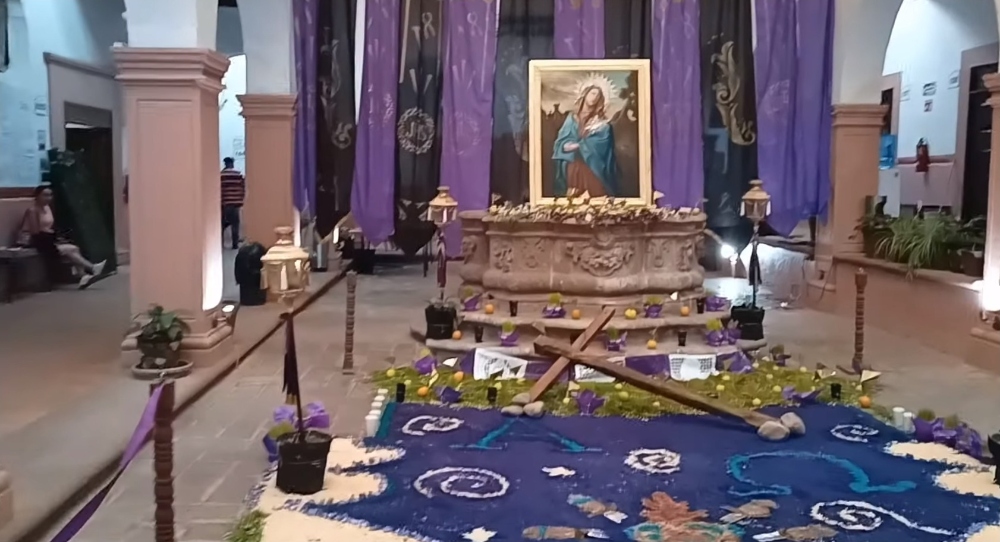March 23 was “Viernes de Dolores,” or the Friday of Sorrows here in San Miguel. It is a day, one week before Good Friday, devoted to Mary and her sorrow as Holy Week approaches. Throughout town there are altars to the Virgin. In the evening people visit these altars, some of which are created at fountains around town, many of which are in homes and some in public buildings. People line up to go in and pay their respects. Despite the “Friday of Sorrows” designation, the mood on the street last evening was buoyant and festive. Religious devotion and partying don’t seem to be mutually exclusive here.

These altars, like many festival creations in San Miguel, are here today and gone tomorrow. Their temporary nature doesn’t mean they aren’t elaborate or that those who create them haven’t spent a lot of time on it. Quite the contrary. They are beautiful and detailed. Herbs like chamomile and sage often surround the altar itself or a pathway to it, which means the visual is augmented by lovely but subtle fragrances. There’s music too, usually recorded. Frequently, visitors are given some kind of food or beverage, maybe a coconut flavored drink or a cup of nuts or fruit.
Last weekend there was a procession which brought an especially venerated effigy of Jesus from an outlying town into San Miguel. For the final 500 yards of the procession the street was prepared with colorful mosaics made of wood chips as a central pathway while the rest of the cobblestone street was covered in clumps of fresh chamomile, sage, mint, and thyme. With hundreds of people walking on this pathway, it more or less disappeared. The next day it’s all is gone, bagged and carried away.
Such elaborate displays for such a brief time. To me the temporary nature emphasizes its character as an offering to God. Heartfelt, beautiful, but here today, gone tomorrow. Meant for God, or one or another saint, but temporary. An outpouring, an offering, lifted up to vanish. Let go, not held, grasped or protected.
Last Sunday there were two processions for Palm Sunday, each with a man on a donkey. Why two? Don’t know. There are 15 major churches in town. Each one has its own events and processions. Maybe they compete with one another? Churches have been known to do that.
Being here in San Miguel gives me a real feel for the original Holy Week in Jerusalem where 200,00 pilgrims would crowd into that city. Lots of visitors here in San Miguel for Semana Santa, Holy Week. Not anything I’ve experienced before, certainly not in Seattle, the public events and crowds. But it does give you a feel for the Holy Week story we read and tell this week.
Another thing it makes you think about is all the conflict and consternation around religious displays, manager scenes and the like, in the States. Does all this in San Miguel add up to some kind of improper melding of church and state? Do people of other faiths or no religious faith here feel oppressed or infringed upon by all this? It’s impossible to imagine such festivities being prohibited in the name of separation of church and state, which does exist in Mexico. Catholic churches cannot own property; they only own the inside of the churches. Which makes me wonder how building maintenance is handled.
Perhaps if some public expressions of religious faith, and not only Christian ones, had been more readily tolerated in the States, e.g. not being offended if someone says “Merry Christmas,” there wouldn’t be the more militant and problematic “Christian Nationalism”? Hard to say. It does seem clear that people here feel comfortable mixing and matching, combining elements of the indigenous cultures, Aztec, Christian, and the secular without getting too uptight about it. At least, it appears that way to this gringo.
Discover more from Post Alley
Subscribe to get the latest posts sent to your email.

Same in Portugal, as far as I know there’s nothing like the Christian right. In a Catholic country, you’re born into a culture with a long established religion. Some people believe it, some don’t. No one really cares whether you’re into it, it’s there if you want it. If you want to be super pious, that’s OK. But if you want to be a big shot preacher with a huge lucrative following, I doubt there’s any way to get there. There are other games in town, but they have small followings, both in people and resources.
What I find odd, is the amount of Buddhist imagery in the furnishing knick-knack department. Portugal has “China stores” filled with cheap stuff usually imported from the far east, and they’ll have shelves of Christian religious statuettes, little saints and whatnot But in a regular store that sells decorative stuff, you will find bronze seated Buddhas. Not really much that appears to have any specific references, I mean I don’t think it’s Buddhist iconography for a believer, it’s just a symbol of something.
Thanks, perceptive column.
Thank you for sharing.
The people you are experiencing this week with are so different than we are. They are at ease with their faith, and by your observations, have no need to question anyone else’s.
A good lesson about being less serious, more joyous about one’s own faith, and simply accepting those who do not share it without political hatred.